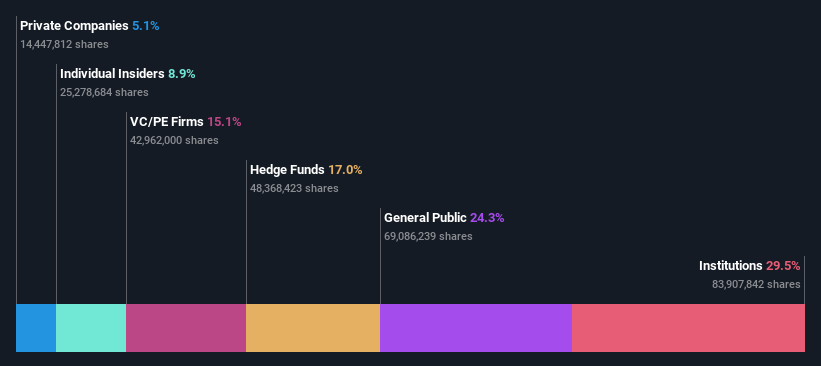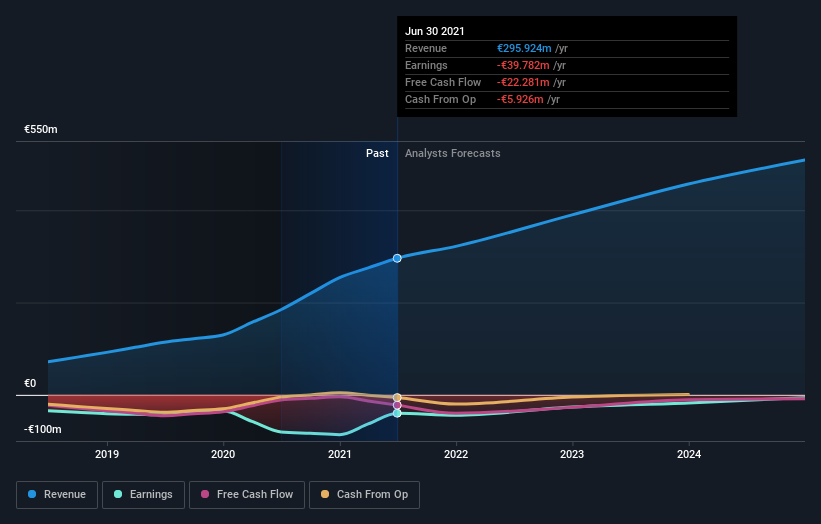- Australia
- /
- Food and Staples Retail
- /
- ASX:MMM
In the wake of Marley Spoon AG's (ASX:MMM) latest AU$43m market cap drop, institutional owners may be forced to take severe actions

To get a sense of who is truly in control of Marley Spoon AG (ASX:MMM), it is important to understand the ownership structure of the business. We can see that institutions own the lion's share in the company with 30% ownership. Put another way, the group faces the maximum upside potential (or downside risk).
And institutional investors endured the highest losses after the company's share price fell by 18% last week. The recent loss, which adds to a one-year loss of 73% for stockholders, may not sit well with this group of investors. Also referred to as "smart money", institutions have a lot of sway over how a stock's price moves. As a result, if the downtrend continues, institutions may face pressures to sell Marley Spoon, which might have negative implications on individual investors.
In the chart below, we zoom in on the different ownership groups of Marley Spoon.
Check out our latest analysis for Marley Spoon

What Does The Institutional Ownership Tell Us About Marley Spoon?
Institutional investors commonly compare their own returns to the returns of a commonly followed index. So they generally do consider buying larger companies that are included in the relevant benchmark index.
As you can see, institutional investors have a fair amount of stake in Marley Spoon. This suggests some credibility amongst professional investors. But we can't rely on that fact alone since institutions make bad investments sometimes, just like everyone does. When multiple institutions own a stock, there's always a risk that they are in a 'crowded trade'. When such a trade goes wrong, multiple parties may compete to sell stock fast. This risk is higher in a company without a history of growth. You can see Marley Spoon's historic earnings and revenue below, but keep in mind there's always more to the story.

It looks like hedge funds own 17% of Marley Spoon shares. That worth noting, since hedge funds are often quite active investors, who may try to influence management. Many want to see value creation (and a higher share price) in the short term or medium term. Our data shows that Conifer Management, LLC is the largest shareholder with 17% of shares outstanding. Union Square Ventures, LLC is the second largest shareholder owning 15% of common stock, and Perennial Value Management Limited holds about 10% of the company stock. Furthermore, CEO Gilbert Siegel is the owner of 6.7% of the company's shares.
On looking further, we found that 54% of the shares are owned by the top 5 shareholders. In other words, these shareholders have a meaningful say in the decisions of the company.
While studying institutional ownership for a company can add value to your research, it is also a good practice to research analyst recommendations to get a deeper understand of a stock's expected performance. There are plenty of analysts covering the stock, so it might be worth seeing what they are forecasting, too.
Insider Ownership Of Marley Spoon
The definition of company insiders can be subjective and does vary between jurisdictions. Our data reflects individual insiders, capturing board members at the very least. Company management run the business, but the CEO will answer to the board, even if he or she is a member of it.
Insider ownership is positive when it signals leadership are thinking like the true owners of the company. However, high insider ownership can also give immense power to a small group within the company. This can be negative in some circumstances.
We can see that insiders own shares in Marley Spoon AG. As individuals, the insiders collectively own AU$18m worth of the AU$199m company. It is good to see some investment by insiders, but we usually like to see higher insider holdings. It might be worth checking if those insiders have been buying.
General Public Ownership
The general public, who are usually individual investors, hold a 24% stake in Marley Spoon. This size of ownership, while considerable, may not be enough to change company policy if the decision is not in sync with other large shareholders.
Private Equity Ownership
Private equity firms hold a 15% stake in Marley Spoon. This suggests they can be influential in key policy decisions. Some investors might be encouraged by this, since private equity are sometimes able to encourage strategies that help the market see the value in the company. Alternatively, those holders might be exiting the investment after taking it public.
Private Company Ownership
Our data indicates that Private Companies hold 5.1%, of the company's shares. It might be worth looking deeper into this. If related parties, such as insiders, have an interest in one of these private companies, that should be disclosed in the annual report. Private companies may also have a strategic interest in the company.
Next Steps:
I find it very interesting to look at who exactly owns a company. But to truly gain insight, we need to consider other information, too. Be aware that Marley Spoon is showing 4 warning signs in our investment analysis , and 1 of those is potentially serious...
If you would prefer discover what analysts are predicting in terms of future growth, do not miss this free report on analyst forecasts.
NB: Figures in this article are calculated using data from the last twelve months, which refer to the 12-month period ending on the last date of the month the financial statement is dated. This may not be consistent with full year annual report figures.
New: Manage All Your Stock Portfolios in One Place
We've created the ultimate portfolio companion for stock investors, and it's free.
• Connect an unlimited number of Portfolios and see your total in one currency
• Be alerted to new Warning Signs or Risks via email or mobile
• Track the Fair Value of your stocks
Have feedback on this article? Concerned about the content? Get in touch with us directly. Alternatively, email editorial-team (at) simplywallst.com.
This article by Simply Wall St is general in nature. We provide commentary based on historical data and analyst forecasts only using an unbiased methodology and our articles are not intended to be financial advice. It does not constitute a recommendation to buy or sell any stock, and does not take account of your objectives, or your financial situation. We aim to bring you long-term focused analysis driven by fundamental data. Note that our analysis may not factor in the latest price-sensitive company announcements or qualitative material. Simply Wall St has no position in any stocks mentioned.
About ASX:MMM
Marley Spoon
Engages in the provision of subscription-based weekly meal kit services in the United States, Australia, Austria, Belgium, Germany, and the Netherlands.
Slight and slightly overvalued.
Similar Companies
Market Insights
Community Narratives




